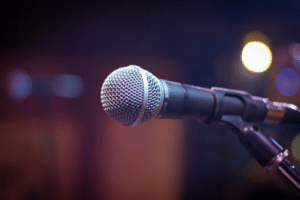
Image link: https://www.pexels.com/photo/black-and-gray-microphone-164829/
Source: Pexels
The global pandemic has undoubtedly devastated the music industry due to more and more events continuing to be pushed back indefinitely. Despite this, people have been making the most out of the situation. Indeed, both professionals and amateurs have been maximizing the use of the digital space. Theatre groups have been putting on online performances that have brought theatre closer to audiences than ever before. Online choirs have also become more and more popular, using the multitude of streaming platforms to expand their reach and bring the music to the people. Music enthusiasts also seem to be passing the time by creating music of their own. These range from recording covers of popular songs or full-blown quarantine albums recorded DIY style.
This is due to the slew of tools and resources available online that have made making music infinitely easier for beginners. Harmony Helper can be pretty useful, as it can aid in mastering vocal work to get you ready for recording. It can help fine-tune everything from vocal harmony to rhythm and pitch. Once you feel like you’re ready to record, the first thing you have to do is get yourself a reliable microphone. However, it may be quite difficult to pick one out especially if you don’t know what you’re after. There are many things to consider when choosing the best microphone for vocals. From condenser and dynamic mics to how a microphone captures sound, this article will ensure you make the right choice.
Condenser or Dynamic
Now, the first decision you have to make is whether to get a dynamic microphone or a condenser microphone. While each mic has its own strengths and weaknesses, it’s important to note that condenser mics are typically better for indoor and studio recording. Dynamic mics are commonly used for live performances. For the most part, you won’t really want to use dynamic mics for home recordings as they are less sensitive than their condenser mic counterparts.
Condenser mics are considered some of the best mics for vocals when it comes to studio recording, as they are often more versatile and are more sensitive to sound. This makes them a great mic for picking up the subtleties and nuances of one’s voice. You may also want to make use of a pop filter, as it can help filter out the harsh sounds that the condenser mic tends to pick up. If you don’t want to spend on a pop filter, you may also use a spare sock.
Frequency Response
While it may sound complicated, the frequency response is something well worth understanding especially when choosing a microphone. This is a microphone’s ability to reproduce the sound that it captures. While a microphone captures your voice, the sound that passes through it and is reproduced is rarely the exact sound that went in.
The optimal range you’ll want for a vocal mic is around 80 Hz to 15 kHz. This should be more than enough to capture vocals and reproduce them in an acceptable way. However, this may differ if you’re going to be recording instruments as well. This is why people often record instrumentals separately from vocals.
Sensitivity and SPL
Lastly, you’ll want to take the sensitivity and sound pressure level (SPL) into consideration. Not to be confused with frequency, sensitivity is how quiet a sound a microphone can detect. This might be worth taking into consideration if you’re recording space is prone to noise. You’ll want to get a mic with a sensitivity range between 8 mV/Pa and 32 mV/Pa, as this is the studio standard and will help you sufficiently capture the recordings.
SPL, on the other hand, refers to is the maximum volume the mic can handle before eroding in quality. While this shouldn’t be too much of a problem for vocals, you may want to take this into consideration if you’ll shouting or recording vocals that are particularly louder than usual. Typically, in settings with low SPL, a microphone with high sensitivity is used to keep the amplification noise low. In those with higher SPL, a low-sensitivity microphone is recommended.
Of the many things we’ve learned during this time of social distancing, it’s been made clear that our need for a creative outlet and our desire to remain connected through music will prevail. For more information on how our app can help you, we have plenty of articles and tips.
Exclusively written for HARMONYHELPER.COM
By: Rianne Jhenna
